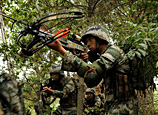
“Different surgeries need different plans to lower the risk of exposure,” he said. “For example, HIV is rarely transmitted through tears, and there is little bloodshed in eye surgery. However, in brain surgery, where we need to drill through a patient’s skull, bone and blood will fly into the air. If a patient has a high viral load, it’s easier for surgeons to get infected.”
He emphasized that such standards are not just for dealing with operations on HIV carriers. But people with other conditions, such as SARS, hepatitis and tuberculosis.
However, regardless of the type of virus, Fu Yan, a head nurse at Beijing You’an Hospital, which provides anti-viral treatment for HIV, insisted that universal precautions are needed to prevent medics from being exposed to patients’ blood and other bodily fluids.
“The emergency response and compensation guidance show that government cares,” she said, “but taking precautions is the most important thing.
“I don’t want any of us to have the chance to ‘enjoy’ such policies.”















 First national day for road safety marked around China
First national day for road safety marked around China


![]()
